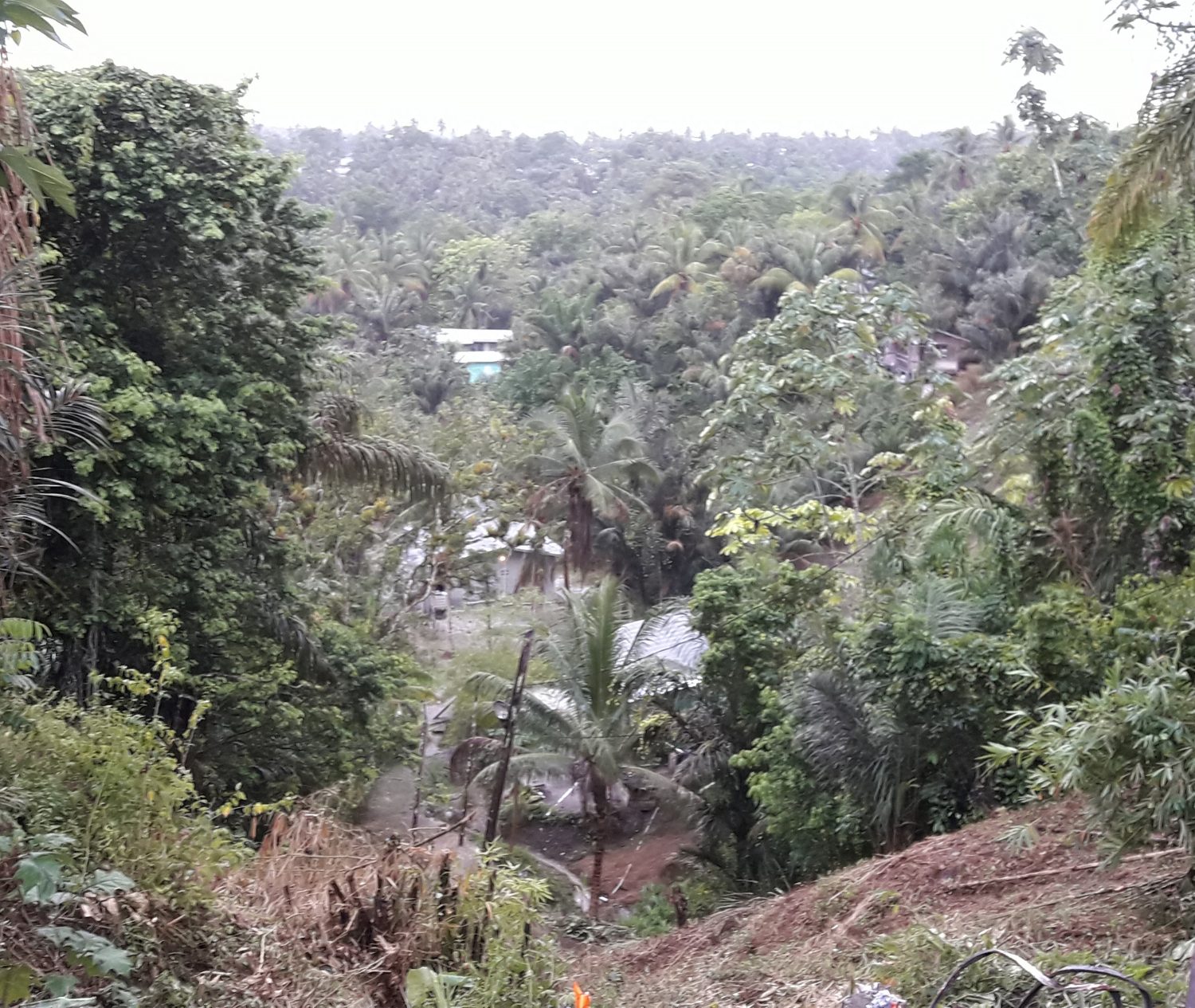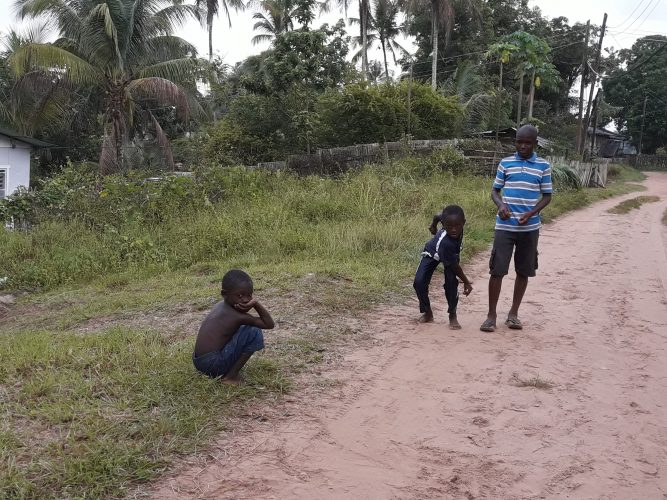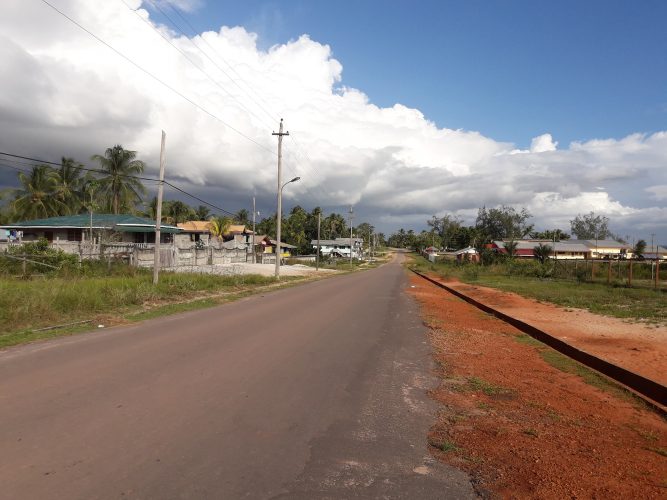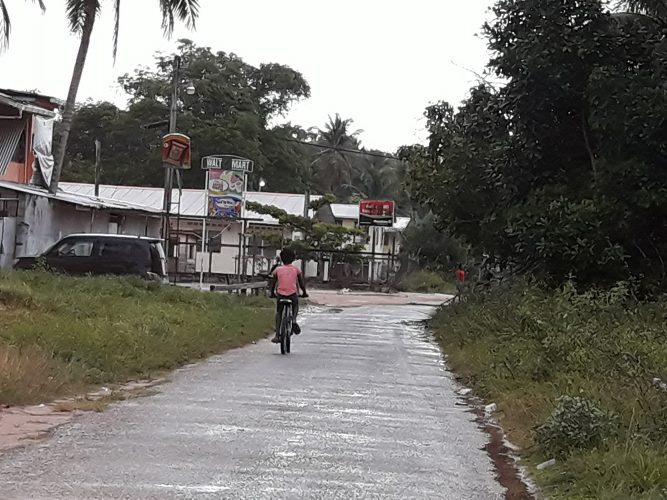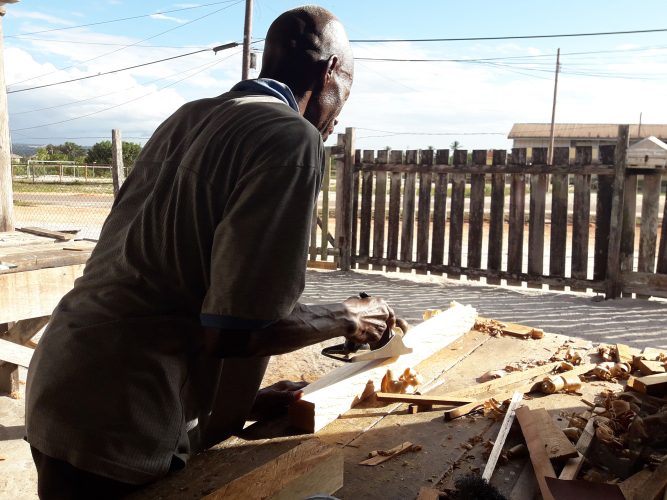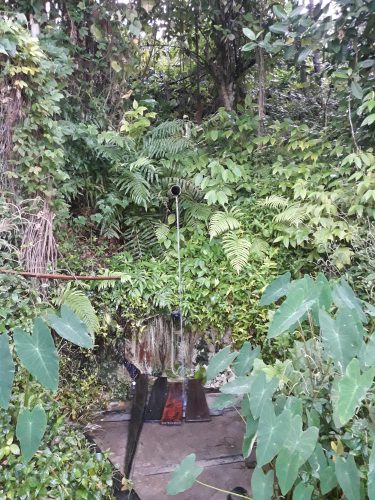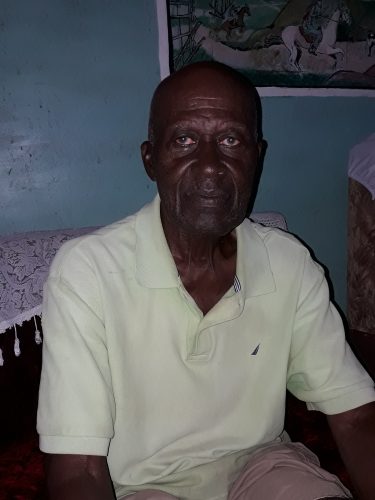Blueberry Hill, is a beautiful village situated on one of the hills in Wismar, Linden and is a haven to the more than 1,500 people living there. The village dates back to the mid 1900s and is situated almost 70 miles from the capital.
No one knows for sure, but rumour has it that the village got its name from the blue/mauve berries locally called “jumbie bubbies” that grow wild in abundance all about the hill. Today, however, they are scarce and said to be located on the outskirts of the village.
To get to the village, one must travel an hour and fifteen minutes from Georgetown to the bus park in Linden before boarding a speed boat across the Demerara River to Wismar before taking a taxi. Unless one has a vehicle, a taxi is the mode of transportation.
Harold Luke was busy shaving wood, trying to finish a set of dining chairs in time for Christmas, when I turned up at his workshop. The man said he usually takes about two weeks to finish a dining set and would use soft wood (furniture wood/crab wood) to make them. He gets the wood from the sawmill situated at the back of the village. He has been a joiner longer than he has been a resident of Blueberry Hill. In fact he has been making furniture for more than 30 years.
Luke, who moved to Blueberry Hill over 20 years ago, said the village is rumoured to be about 80 years old.
“It’s nice to be living on a hill…we don’t get flooding,” Luke said. However, he went on to say that because the village is situated in the Hilly, Sand and Clay Region, the soil is sandy and is usually hot until late at night when it gets cool.
Blueberry receives electricity from the Linden Utility Services Cooperative Society Limited (LUSCSL) and potable water through Guyana Water Inc. Luke said that prior to having the water service, everyone used the springs around the area. Those springs are still being used today by some people for drinking, washing, cooking and bathing.
Leaving Luke, I set off to find one of the earliest settlers in the village. Along the road, I noticed red-stained drains running all through the village, they were bare and clean, a total opposite of those in Georgetown and the villages on the Low Coastal Plain. All the water the drains catch run down the hill keeping the land dry.
At a house where a pressure cooker whistled in the kitchen, I found 84-year-old Raymond Fraser, one of the earliest settlers. He had arrived in 1952 with his mother. They stayed for a year in the area and left to work in Ituni. Fraser, who was 19 years old at the time, drove trucks, while his stepfather drove trains from Ituni to the Mackenzie/Wismar junction where he offloaded logs.
“There was a man named Allan Hudson that contract with the Demba Company. The workers from the company lived in zinc houses and the company had imported for them, wooden stoves. The stove had a part to bake on, a part to cook on and another part to put the firewood in. Another man by the name of Claude Samseer used to buy the wood off from Allan and provide the people with firewood. I brought the wood (wallaba) from the bush and the company would send the wood four feet long by flat car and two feet long wallaba went by gondola,” Fraser said.
He spoke about arriving in the village and described it as “sheer bush”. Fraser and other young men around his age sometimes 20 or more of them would often play in a clean, fenced-off area until an overseer one day called them and told them that the place was being prepared for the Wismar Hospital and that they should find somewhere else to play. She further explained to them that although the area was bushy, it was already divided into different plots and if they looked carefully they would find small pickets of wood with numbers cordoning off each lot. She advised them to clear which lots they wanted for themselves. No sooner had she said that than the cricket game ceased. That Sunday saw Fraser and five other friends—Frederick Nicholson, Glasgow, Dotson, Armel Bobb and Chubby Wills—clearing lots side by side to live. Nicholson passed some years ago, while Bobb died on a few weeks ago.
Fraser added that they played cricket on a few cleared vacant lots situated obliquely opposite the hospital after that. The Wismar Hospital was constructed in 1974 and opened in 75.
The octogenarian went on to say that after he settled he lived with his dog, Bully, who would follow him to the water landing where they separated but when he returned at midnight, Bully would be waiting for him. His late friend and neighbour Nicholson, he said, had a big black and white dog he called Lion who went all over with him.
Now the story as it goes, the village was prowled by jaguars at nights and some nights Fraser would see a particular big cat coming through a usual pathway he used into the village. He and the men got together and planned for it, digging a hole 10’by 6’ (length by width) and 6’ deep right in its path and covering it with rotted wood. Fraser left for work that afternoon and when he returned that night, he called to Bully, but his dog was nowhere in sight. He continued home looking for Bully as he went and calling for him. Arriving home, he remembered about the jaguar and went to see if they had caught it. He peered into the hole and saw the animal walking around trapped inside and beside it, a dead Bully. Apparently, the men used Bully as bait so that when the jaguar saw its prey it would pounce on it and fall into the hole. That’s exactly what happened.
Fraser said he was angry at the tragedy that had befallen his beloved pet, but it subsided eventually as he realized they had managed to rid the village of the predator.
However, the story didn’t end there as they decided to inform the company about the animal and their bosses said they would like to have the animal’s skin. At the time, some men were visiting from Belladrum, Berbice and on seeing the dead cat planned to cook it. Fraser, surprised, said he told them it was a “tiger” and that people do not eat tigers, but the women around said when they looked into the hole said they did not see any tiger, all they saw was was meat. So that was the end of the jaguar; the men curried and stewed it and ate jaguar with the rotis the women made; not Fraser though. The skin, the Berbice men kept it.
Christmas time, Fraser shared, was vastly different from now adding that it was merrier. “In the days that passed, Christmas was something better by far, far, far. The parents and neighbours used to get together and make pepper pot, garlic pork and ginger beer. A neighbour will come over at you and y’all will eat then y’all will go at the next neighbour and eat and gaff some more and do the same thing with the other neighbours.”
The elderly man, who lives alone, said Christmas now is still nice but those days could never come back, they will only be beautiful memories that only those in his time could only truly know and explain. Nowadays, his daughter would send him an entire baked chicken and also take him to visit different family, relatives and other children.
Contemplating the chicken he will be receiving tomorrow (Christmas), Fraser recalled his boyhood days when chicken curry was too rare to be called ‘rare’. “It had these older men in those days walking home with their bag of rice on their backs and sometimes it does bore and mummy had plenty fowls and they used to be on the road pecking at the rice. So many times, we asked her for fowl curry and she used to say that the fowls need to live because she needed eggs to bake her cakes for Christmas. Boy, we used to glad when some careless driver used to knock down one; sometimes it barely get a small thing on it wing and we running to she for fowl curry; that’s the only time we’ll get a sweet fowl curry,” chuckled Fraser.
Blueberry Hill, he said, is a quiet and nice area adding that the people are nice and always look out for each other.
Although he has aged much, Fraser takes care of his home and keeps a little garden at his daughter in Block Number 22, another village in Wismar, a little over a mile away.
Eon Nicholson, the son of Frederick lives next door with his family. He is the technical teacher and administrator at Leonora Technical Institute.
“Growing up on a hill… the people are friendly and family oriented; it’s much safer here. People walk any hour of the night here,” Nicholson said.
He began as a teacher at the Linden Technical Institute in 1992 and at the time he left to become the deputy at Leonora, was the acting senior lecturer.
He said that according to older folks of the village, the multilateral school in Blueberry Hill was supposed to be where the hospital is, and the hospital where the school is today.
It was Nicholson who said that he learnt that the village got its name after the “jumbie bubbies”.
Christmas, when he was a boy, Nicholson said, saw the older men headed to Barry’s shop, one of the oldest in the village to play dominoes, visiting each other’s homes for breakfast or lunch and in the afternoon, they had athletic sports where the children living in the teacher’s compound on Blueberry Hill challenged the children living outside of the compound.
Today Christmas though not the same, still has that special feeling and would see the neighbours sharing food and cakes. But the love in village is still there and people have each other’s backs still. Nicholson said that if he decided to leave on vacation with his family, he knows for sure the neighbours will look over his place.
Being so far away from work, the man said, can pose a disadvantage because of the Demerara Habour Bridge. When they close off to traffic on the East Bank Demerara to allow for the double lane for traffic coming from the West Bank Demerara it sometimes makes him late for work. To offset this, he travels to work on Mondays and back home on weekends. He would leave at 5 o’clock on Monday mornings.
Nicholson said that what the village needs right now is better roads.
Speaking of the springs, he said, residents still use them for drinking purposes and have made it easier to direct the flow of the water by using pipelines.
The people living in Blueberry Hill are miners, farmers, loggers, carpenters, teachers, nurses and taxi drivers. Some of the first families to settle there are the Nicholsons, Frasers, Glasgows, Pillous and Barringtons.
